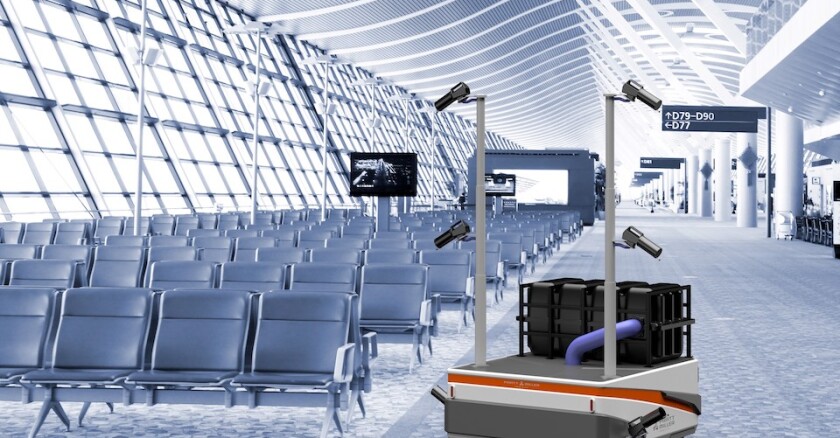Pratt Miller Mobility presented a live demonstration of its new large area autonomous Disinfecting (LaaD) robotic vehicle at the airport on Wednesday, July 15.
The robot autonomously surveys and dispenses an FDA-approved disinfecting solution on high-contact surfaces within the airport including seating, gates and vending machines.
“It was created to disinfect large areas, airport terminals such as this, large retailers, other large facilities to rebuild confidence and provide safer environments for everyone,” said Christopher Andrews, director of mobility and innovation for Pratt Miller, during the demonstration.
The machine visually documents any missed areas so staff members may go back and disinfect manually, a benefit manual disinfecting does not have, officials say.
Stephen Clark, airport business development manager, said the robotic vehicle will begin sanitizing the airport tonight.
In May, the Michigan Economic Development Corporation (MEDC) announced grants to five companies to help solve mobility issues from the coronavirus pandemic, including $50,000 to New Hudson-based Pratt Miller for the airport project.
PlanetM, is the state’s mobility initiative, making awards through its technology activation grant program.
Approximately $300,000 was awarded to the companies in total to aid in the development and deployment of solutions that address the mobility challenges COVID-19 presents.
“Whether that’s keeping bus drivers safe, keeping travelers through airports safer, combating the virus, we knew it was time to step up and we knew there were Michigan companies that could design, develop and deploy new solutions just like Pratt Miller has done here,” Charlie Tyson, technology activation manager for Planet M, said Wednesday.
In May, Tyson also said the resiliency and innovation that these companies are displaying in the face of the global pandemic will make a significant difference as the industry comes together to fight the virus.
According to Simon Dean, vice president of engineering and mobility for Pratt Miller Mobility, the LaaD vehicle can disinfect one terminal in approximately five minutes and the entire airport in roughly an hour.
While the solution is not harmful to humans, officials say airport staff will likely use the machine at night when foot traffic is slow.
Based on data gathered during this pilot program, the airport will be able to compare the benefits, cost, time and effort of using the machine to that of regular manual cleaning.
Pratt Miller Mobility officials say they plan to evaluate the efficiency of their new technology in the next four to five months and begin to plan to implement the device in other large spaces. This may include shopping centers, casinos and other airports around the state of Michigan.
More information is available at prattmiller.com/laad.
The other four state grant recipients are:
GHSP ($80,000) is a Grand Haven-based engineering firm developing a first-of-its-kind mobile UV-C treatment, gr\u0113nlite\u2122. Using high-and-low dose UV-C light, the system is able to sense when there are occupants in a shared vehicle space and will disinfect the air and high-touch surfaces following their exit, reducing COVID-19 and other disease-causing germs for those on the front lines. The technology was first integrated into May Mobility’s autonomous shuttle fleet as part of the Grand Rapids Autonomous Vehicle Initiative.
Gatik ($100,000), a California-based autonomous delivery company, is working with one of the state’s largest retailers to automate their on-road transportation network, according to the state. The pilot involves deploying autonomous delivery vehicles on predetermined, fixed routes throughout Grand Rapids and Rochester, Mich. This partnership will help reduce human-to-human transmission channels of COVID-19 via contactless delivery, minimize personnel-based disruptions to the supply chain and transform the way groceries, health products and other everyday goods.
Penske Vehicle Services ($28,000) is working with the city of Detroit. A current mobility challenge facing the city is transporting passengers while protecting transit workers against COVID-19. Troy-based Penske started production on temporary vehicle occupant safety partitions, which are portable, clear vinyl barriers designed to increase physical separation between front seat drivers and back seat occupants of passenger vehicles.
RCO Engineering ($28,000) will develop and pilot partitions to help offer some additional level of comfort for the drivers tasked with transporting residents to and from their destinations. The partition will not be designed to permanently alter the vehicles in any way. The city of Detroit will provide vehicles to be outfitted with RCO’s partition solution.
©2020 MLive.com, Distributed by Tribune Content Agency, LLC.














